Peter MALONE
Saturday, 18 September 2021 19:54
Blackhat
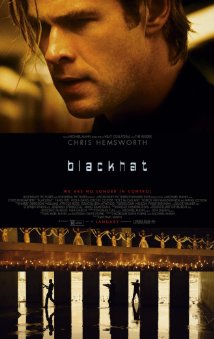
BLACKHAT
US, 2015, 133 minutes, Colour.
Chris Hemsworth, Leehom Wang, Wei Tang, Viola Davis, Yorick van Wageningen.
Directed by Michael Mann.
Blackhat is certainly topical. The title refers to computer hacking and hackers. And that is certainly topical, with experiences in recent months where Sony Pictures was hacked on the occasion of the release of The Interview, suspects, amongst others, North Korea which was being satirised in the film. There have been a number of successful hacking’s of American government and military sites.
This is not a film for Luddites. If the audience is not sympathetic to computers, there will be far too much detail, too much hacking, too much hacking the hackers, and trying to deal with information technology and communication. But, this screenplay does strive to provide enough information to make what is going on intelligible (more or less).
The audience can see, right from the opening credits, that hacking has explosive results, even literally with government and company installations. As we watch the progress and process of the hacking, we see it leading to destruction in both China and in Chicago. Chinese authorities as well as the FBI come in on the case, one young expert recognising that a program being used was created by a friend who is, in fact, in jail for hacking crimes. FBI authorities (including Viola Davis) agree to get him released temporarily to work on the sabotage but he is particularly strong minded, makes no deals unless he sets the terms. Out of prison he comes.
He is Nick Hathaway, played by Chris Hemsworth, taking time off from being Thor. He is a big man, an abrupt manner, taciturn, not particularly relational, clever at his work, his investigations, his conclusions. Just when we thought he couldn’t have a relationship, he is attracted by the sister of one of the Chinese agents. She becomes a significant contributor to the solution of the problems.
The investigation takes place in Chicago but then all and sundry move to China, recognising the hacker but also detecting the influence of some of his clients, which leads to violent shootouts in China. Nick and the Chinese girl then travel to Malaysia visiting and examining a drive river bed where tin is being mined and which is about to be flooded, making tin scarce and so raising profit margins. And the action moves to Indonesia, to a crowded Jakarta, where the climax takes place, violent confrontation during a crowded public ritual ceremony.
The film was directed by Michael Mann, well known in the past for Miami Vice, making films every couple of years, best known for The Last of the Mohicans, Heat and, more recently, Public Enemy. His visual style is idiosyncratic, using muted light with action often taking place at night or in darkness, coming to bright light in the Malaysians sequences, a great relief, and in some of the Indonesian sequences. Because it is dealing with IT, it is more of a cerebral thriller, although there is quite some action, shootouts and fights.
1. The title? The reference to hackers? Link with actual cases in the United States, China? Companies, manufacturing, crops, metal exploration? Profit?
2. Cyberknowledge and the audience knowing enough, the film’s screenplay giving enough information? Words? Visuals?
3. The international scene, in the United States, China, Malaysia in the mines, Indonesia and the cities? The musical score?
4. The work of Michael Mann, his success with thrillers? His visual style, action, editing and pace? Dark and muted photography? Night, the contrast with daylight in Malaysia? Darkness and moods?
5. Credits, the visuals of the hacking, the detail, the process, the explosions? The impact in China? In Chicago?
6. The authorities on their response, America, the FBI? Carol Barrett, stern, and the other officials? Consulters? The programmer, the codes, his remembering the work of Nick Hathaway, Hathaway in prison?
7. Nick, in prison, his attitudes, his abrupt and blunt dealing with people, laying out the conditions the deals? Getting out, the conditions? Working with his friend? With Carol? His attitudes towards her and her responses?
8. Investigation, the computer details, the details of the programming, his knowledge, expertise, recognition of information?
9. The Chinese agents, go why, working with Dawei and Lien, their work, in the United States, information, the decision to go to China, the collaboration, the relationship between the Chinese and the FBI?
10. Nick’s relationship with Lien, Dawei and his comment about his sister’s happiness?
11. The hacker, intentions, the range of clients?
12. The Carol, stir attitudes, wary of the, becoming involved, the surprise of her being killed?
13. The thugs, the vicious viciousness of the attacks, the shootouts, fight and action? Daweis’ death? The effect on his sister? Nick and advising her to grieve later?
14. The plans, the decision to go to Malaysia, the visuals of the river bed, information about the tin mining, the flooding of the river bed, the ruthless exploitation destruction? Tin and the demand? Profit?
15. Going to Indonesia, the client and the $74 million in the bank, arranging its disappearance? Lien visiting the bank, charming the official, the transfer? The information, tracking the client, his character, the phone calls, meeting in public, rituals and ceremony, the following the client and his bodyguard, Nick’s preparation, taping the weapons? Lien and her various jobs? The ground, following, the bodyguard turning, the fight, study, the confrontation with the client?
16. Nick and the client, the discussion, knowledge, profit from tin, the transfer of the money, the shooting, death and escape?
17. The insight into the world of hacking, theft, the response of governments, authorities, calling of experts, action?
Published in Movie Reviews
Published in
Movie Reviews
Tagged under
Saturday, 18 September 2021 19:54
It Follows
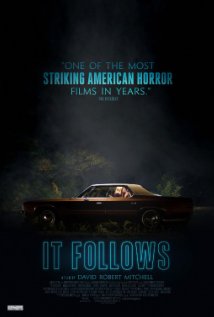
IT FOLLOWS
US, 2015, 100 minutes, Colour.
Maika Monroe, Keir Gilchrist, Daniel Zovatto, Jake Weary.
Directed by David Robert Mitchell.
On the one hand, this teenage horror thriller has received accolades from critics and has been popular with the target audience. On the other hand, there have been quite a lot of criticisms that the film is a poor example of what it sets out to be.
A film which has a title It Follows should make logical sense. This is not true of so much of the screenplay here, sometimes giving the impression that the makers were making it up as they went along, not plotting cause and effect, simply offering sequences and moving on to another whether it made sense or not. It might be argued that that the film is a subjective perspective from the central character, sometimes hallucinating, sometimes dreaming – which might give some explanation to scenes that seemed to have no connection at all (the heroine fleeing from her pursuer in the house, driving away intensely, then found sleeping on the top of her car near the beach, then seeing three men in a boat and stripping to her bathing suit – and a sudden cutting to her sleeping on the floor of the house!).
Once again, those in favour of the film have referred to the performances as “understated”. This reviewer, thought that they were barely stated at all, not very convincing performances and not helped by the rather flat dialogue.
What was stated, or overstated, was a loud and strident discordant musical score from a group called Disasterpeace.
There is a prologue which seems to indicate much more than what follows, a terrified woman running in the streets, getting into the her car, ruminating on the beach, a sense of something dreadful; morning comes and there is her body lying on the beach, limbs distorted, some broken. No other reference made to this throughout the film, simply a suggestion that something fearful could be following.
The main characters are teenagers seemingly in high school, perhaps the final year. One is a visiting male character who is referred to as being 21. Parents seem to be absent, a glimpse or two, and the final glimpse of a murderous mother, but, otherwise, where were they, especially as some of the characters spend some time in hospital with only their friends waiting around?
The central character, Jay, has some girlfriends (one, bespectacled, reading continually from a Kindle which looks like a compact case and quoting Dostoevsky) and an admirer, a kind of dorky character called Paul. She is going out with the 21-year-old visitor who sees a girl in a cinema which his girlfriend doesn’t see. He then becomes pretty nervy, but they do have a sexual encounter in his car, with his running off without explanation. The apologising when they track him down. Later, we discover that this sense of dread, with a sense of someone following, can be passed on through sexual encounter, some noting this as an allegory of STDS (though film reviewer, Alan Frank, thought this meant Sexually Transmitted Demons).
There are many more sequences, some isolated, with a kind of cumulative effect of horror and fear, and an attempt at STDing bringing death to a young man, and a final attempt, which seems rather inconclusive – leaving the heroine and the dork still possessed and doing the following, when the film just stops.
As regards youth films, despite the STDS, the film is rather ordinary, the setting being somewhere out of Detroit – although a climactic scene takes place in a dilapidated suburb (or is that just the perspective of the heroine?) in a large, old and neglected building which, inside, says Detroit Pool, quite a good looking and well-kept swimming pool, where a confrontation with an anonymous Follower takes place. This is the blood scene, no gore!
This review is not a fan’s response, but rather an expression of exasperation and disappointment.
Published in Movie Reviews
Published in
Movie Reviews
Tagged under
Saturday, 18 September 2021 19:54
Pursuit to Algiers/ Sherlock Holmes Pursuit to Algiers
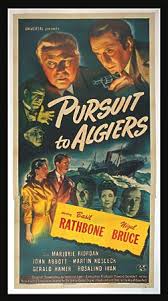
PURSUIT TO ALGIERS/ SHERLOCK HOLMES PURSUIT TO ALGIERS
US, 1945, 69 minutes, Black and white.
Basil Rathbone, Nigel Bruce, Marjorie Riordan.
Directed by Roy William Neill.
Pursuit to Algiers is one of a series of Sherlock Holmes stories (updated to the middle of the 20th century) made by Universal Studios after the initial success of The Adventure of Sherlock Holmes at 20th Century Fox in 1939. Basil Rathbone and Nigel Bruce continue their partnership as the eminent detective and his friend Dr Watson. Rathbone clearly has made the role his own, a strong presence, sharp logic, interest in detection - never smiling but able to be humorous and ironic at the expense of Dr Watson. Nigel Bruce continues to be the bluff Dr Watson.
This film has the atmosphere of the war, assassination attempts on royalty from some European states. Holmes is called in to protect the young Prince was studied in England, homes flying to collect the Prince in Algiers, Watson accompanying the Prince by boat.
There are plotters on board, some brutal murderers and assassins, but Holmes turns up, confronts the assassins, says the Prince – who is not the young man whom Watson was accompanying but rather the steward who serve them, hiding his identity.
Marjorie Riordan is pleasant as a singer from Brooklyn – with Watson having an opportunity to sing.
The usual enjoyment with Basil Rathbone and his homestyle and deductive reasoning, Watson and his not always been fully abreast of the goings-on. He begins to tell the story of the Rat of Sumatra, from one of Doyle stories, with references to different ships from Doyle stories and this screenplay borrowing from adventures Adventures of the Red Circle.
1. The popularity of Sherlock Holmes stories and films? Basil Rathbone and Nigel Bruce incarnating Holmes and Dr Watson? The early 40s and the popular series of short films? In retrospect and in comparisons with other casts of Sherlock Holmes films and television series?
2. Black and white photography, the studio, the suggestions of England, the ship?
3. The political situation, the assassinations in England and on the continent, preserving the Prince who had studied in England? The politicians and their discussions? The plane and its crash?
4. Holmes, recruited to save the Prince, flying, not on the plane, appearing on the ship?
5. The groups on the ship, the politicians, the assassins, Mirko, his attempts and failures, Holmes catching his hand in the window?
6. The singer from Brooklyn, her contract, her singing, avoiding Holmes, his saving her, singing with Watson?
7. The young man, the audience assuming he was the Prince, the attraction to the singer, under Watson’s care? His going from the ship, being taken?
8. Holmes, allowing himself to be captured, Watson and the others freeing him – and the irony that the Prince was really the steward who was serving them and so his identity concealed?
9. A neatly wrapped-up case?
Published in Movie Reviews
Published in
Movie Reviews
Tagged under
Saturday, 18 September 2021 19:54
Ixanul/ Ixanul Volcano
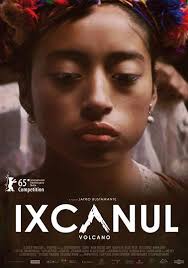
IXCANUL/ IXCANUL VOLCANO
Ixanul/ Volcano is a film of interest because of its portrayal of life in Guatemala and indications of a film industry in that country.
The film could be described as ethnographical, situated in a tribal village, under the shadow of a volcano. The volcano itself is consided having some of the divine, a mother taking her daughter to the volcano to pray and prepare her for a happy marriage. But, the indigenous people have been evangelised centuries earlier so that along with the nature religion, there are elements of Catholicism.
The focus of the family film is the mother and daughter in the family, the mother concerned about their livelihood, the daughter’s marriage, her husband having a job, their dependence on a landowner whom they invite to a meal to discuss a possible marriage. In the meantime, the young girl is attracted by a man of the village who intends to migrate to the United States for a comfortable life. She resists his sexual advances at eventually consents. She had hoped that he would take her away but, of course, he does not and leaves her pregnant.
The mother tries to help her daughter to abort the child but then accepts the reality, with the father in fear of losing his job from the landowner who will despise his daughter. She is beaten by a snake and taken to hospital, gives birth, but is told that the child is dead, and the family is given a coffin which is buried. The daughter feels that the child is still alive, digs up the coffin, finds a brick enclosed – the landowner had got his revenge on the girl by selling her baby.
In its 90 minutes, the film takes on a great number of themes. There is a sympathetic picture of the village, indigenous people speaking their own language, many not understanding Spanish, relying on translators who are not always honest (as in the taking of the census as well as the lies of the landowner).
This is an ethnological film taking audiences deeper into Guatemala and its variety of cultures.
1. The title, physical, psychological, religious, for the people? Activity on the volcano?
2. Guatemala, local cultures, Hispanic cultures, the blend? Issues of languages, customs, the city and country? Religion, Christianity, animist religions? The opening prayer – and it’s not being answered?
3. The local people, the past, language, farms, the pigs in the mating (and success), home, meals, parties and drinking, work in the fields, the role of the spiritual guide, crops and snakes, pregnancy, abortion, hospitalisation?
4. The dominant mother, her husband and his work, their plans, the widower and his family, Maria and the marriage? Maria and her attitude, pregnancy, her mother helping her for an abortion? Clearing the snakes, Maria being bitten, in hospital, the mother and her strong presence?
5. Maria, her age, the initial prayer, working with the pigs, work on the farm? Her relationship with Pepe, the caress and her resistance? His drinking, the party, giving in to him? Her wanting to leave with him? His saying the first time would not produce pregnancy? Her becoming pregnant, the response of her mother, coping, the jumping for the abortion? The snakes, the bite, Hospital? The delivery of the baby? Signing the document? The difficulties with translations? The later revelations about the baby, her grief, the funeral, digging up the coffin and finding a brick?
6. The father, work on the farm, dependence on Ignacio, the meal with the family, depending for his job, going searching for jobs?
7. Ignacio, nice, widower, his parents, the dinner, wanting to marry Maria? The news about the baby, his false translations at the hospital, signing the baby away? Concerned about Maria’s fertility?
8. Pepe, getting away, his description of the American dream?
9. The census people, the difficulties with language, the different translations?
10. The return to the hospital, unaware of what had happened about the baby, the pleas of the mother, Ignacio and his translations, the deception? The mother still pleading?
11. A film about two coexisting cultures in Latin America?
Published in Movie Reviews
Published in
Movie Reviews
Tagged under
Saturday, 18 September 2021 19:54
Club, El/ The Club
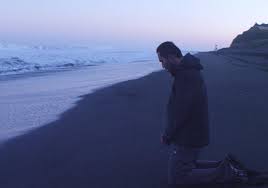
EL CLUB/THE CLUB
Chilli, 2015, 95 minutes, Colour.
Directed by Pablo Larrain.
The Club seems something of a flippant name for the drama that unfolds.
This particular club is a house in an isolated town on the Chilean coast. Four men live there as well as a woman. However, the four men are all priests who have been removed from public ministry. One has dementia and has no knowledge of what he has done to merit his removal. Another is a priest who was a chaplain to the military, listening to the confessions of the personnel for seventeen years, noting everything in a book, which led to disapproval from the military, confiscation of the book (although he says he has everything in his memory), and the church sending him to this house. Another priest is guilty of selling unwanted babies on the black market to the wealthy, saying that you have the poor with your always and this was something of a service. The fourth priest is a paedophile, homosexual in orientation, who finds ways of justifying and even sanctifying his behaviour.
When another priest arrives and is suspicious, the four priests are not welcoming. But, outside the house, one of this priest’s victims is shouting, describing his sexual experiences in great and specific detail, the priest denying it but then shooting himself.
The upshot is that a Jesuit visitor, a psychologist with mission experience in Africa, is sent by officials to examine the priests, and to close down the house, even if it means sending the priests to the police and jail. He questions all the priests which gives the audience an opportunity to look at the priests, listen to them, try to understand their attitude towards the behaviour, justifying it, and living with it while accepting the punishment from the church.
Also in the house is a woman who has been a nun and has decided to stay in the house as housekeeper, caring for the priests, even defending them, not liking the visitor with the impression that he belongs to a new church.
The film shows the life of the priests in some detail, especially their particular interest in training a greyhound and racing it. But, with a kind of vengeance, greyhounds in the town are killed by the priests and the sister kills their own pet greyhound – leading to a lynch-mob against the victim of the sexual abuse.
The visiting priest is shocked at this behaviour takes pity on the wounded victim, talking with him, and bringing him into the house, holding it over the priests and the sister that they have two take him in and care for him. He will not report them.
While there have been many films about priests, and especially about paedophile priests, this one is challenging with the broader range of offences. In terms of paedophilia, the priest rationalises his behaviour, talks about love, that formerly homosexuality was frowned and is now pronounced on as God’s gift, and the effect of his interaction with the boy whom he abused.
This is of particular interest in the situations of the churches of Latin America and of Chile, Catholic countries facing up to the realities of abuse. While some think of this kind of film as an attack on the church, it is an attack on aspects of the church, on individuals and church authorities.
The film was directed by Pablo Larrain, internationally known for his Tony Manero and his political film, No. (His wife portrays the sister in the house.)
1. The title, the quotation from Genesis 1, road separating liked from darkness? The house for the priests? Their life together? Like a club or not?
2. The town on the coast, the house, the surroundings, the sea and the beach, the greyhound races? The solemn musical score?
3. The phenomenon of clerical sexual abuse? Throughout the world? In Chile? The role of the church, cover-ups, will ansferring priests, taking them out of circulation? Other misdemeanours, especially the priest who was is the army chaplain and had a diary of all the confessions? The priests responsible for selling unwanted babies couples?
4. The house, the four priests, their age, personalities, interactions? Sister Monica as housekeeper? Her explaining the rules to the newcomer? The daily routines, prayer, meals, mass, rosary? Their free time?
5. The arrival of Father Mattias, his appearance, his denial? The reaction of the other priests? His getting the upstairs room? The arrival of Sandokan and his calling out, the graphic language and descriptions? The priests and wanting to scare him off with the gun? Father Mattias going out, looking at him, shooting himself? The priests and their later cover-up, saying they were watching reality television, his going outside, killing himself? Sister Monica and her scrubbing the steps afterwards?
6. The characters of the priests? Living with one another? Experiencing it as a jail? The arrival of Father Garcia, Jesuit, missionary in Africa? His commission, the closure of these houses, the interviews and the priests telling lies about the circumstances of the suicide? The individual interrogations, the different reactions? The greyhound racing and his attendance? The old priest and his memory was gone but who repeated Sandokan’s graphic sexual descriptions? The cynical priest, his drinking, his talking about the poor, the selling of the babies? The military chaplain, the diaries, his being exiled, memories of the dictatorship?
7. Father Garcia, his psychological training, his ways of conducting the interviews, sharing the life with the priests, forbidding them to drink? His attitude towards the greyhounds? His interrogations of Sister Monica, lying, then telling the truth?
8. Sister Monica, the influence of John Paul II, becoming a nun, going to Africa, return, distant from her family, withdrawing from the convent? Caretaking, sweeping, cooking? The rules? In herself, devout, religious, loyalty to the church, the old church? Attitudes towards Father Garcia and his closing down the house? Complicit in the denial about Sandokan? The greyhounds, racing, the better, the winnings? Sandokan and his presence? The decision about killing the greyhounds, the bag over the head of the dog? The priest trainer and his grief? Finally admitting the truth? The welcome to Sandokan, his staying?
9. The homosexual priest, the detail of his training the greyhound? Liking the dogs? His meeting exiled from his parish? His comments about homosexuality, previously condemned, now praised, God loving homosexuals? His story, the boy, the bed, face-to-face, spiritualising his relationship? Talking with the tourists on the beach? Offering payment for the bashing of Sandokan? Their punching him? The death of the dog, his grief, unable to forgive Sister Monica? His interactions with other Garcia? His accepting Sandokan?
10. The old priest, memory, no knowledge of his crimes? From the will 1960s? His vivid repetition of Sandokan’s graphic descriptions of sexual activities? His telling the truth about the gun?
11. The angry priest, drinking, the reasons for his being there, his comments about the poor, the unwanted children, the deceptions, selling them to couples? The poisoning of the dog?
12. The chaplain, the years, confessions, the secrets, keeping the diary, the threats from authority, having their details and his memory? His observations on the military, their crimes, guilt and regrets? The rest of the Pinochet era?
13. Sandokan, his scruffy appearance, at the gate, Father Mattias, the past relationship? His shouting, the very explicit details of all aspects of sexual encounter? His talk about the sanctifying of semen? The relationship with Father Mattias, the truth, he shooting himself in front of Sandokan? His trying to get work around the town, jobs, wandering, collecting the chair and other stuff to settle on the hill, the girl at the bar, the talk, the sexual encounter and his homosexual overtones? His being ousted? His talking with Father Garcia? The priests and Monica and the mob attitude, accusing Sandokan of killing the dogs? Lynch law, the brutality of the bashing? Father Garcia, carrying him away, washing his feet, kissing them, the Last Supper overtones? Sandokan clean and his neatness, getting the room upstairs, explaining about his wide range of medications? Staying?
14. The perspective of the director on the church, his own Catholic background, his knowing that there were good priests, careless priests, evil priests? The focus on sexual abuse – and the visual treatment by the church, sending the visitator, closing down the houses, the silence about abuse in Latin American countries compared with English-speaking countries? The prospective changes in the church’s attitude, the police, the law, no cover-ups?
Published in Movie Reviews
Published in
Movie Reviews
Tagged under
Saturday, 18 September 2021 19:54
Body/ 2015
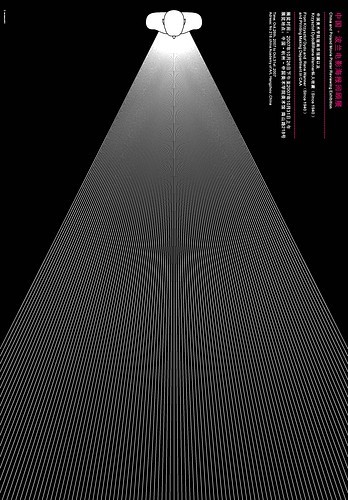
BODY
Poland, 2015, 90 minutes, Colour.
Directed by Malgorzata Szumowska.
Body is an unusual mixture of the serious and comic. It has been directed by Malgazorta Szumowski whose films included the story about prostitutes, Elles, and a film about a priest with a homosexual orientation, In the Name of…
At the beginning of this film, a police inspector goes to find a body hanging by the banks of the river in Warsaw. As they continue their investigations, the police see the corpse come alive and walk away. This introduces the theme of the body, life and death, health… And the possibility of ghosts or the dead walking amongst us in a kind of purgatorial experience.
Part of the film concentrates on the policeman, his work, the death of his wife and his seeming lack of grief, from the perspective of his daughter, a big fat and drinking man, smoking, earning his daughter’s dislike, even hatred. The daughter goes to a rehabilitation centre which is run by a widow, a very strict and prim woman, who enjoys her work with the women, role play, eliciting deep screams… And then going home, had strict and regular routines, her affection for an enormous dog.
She crosses paths with the police inspector when he goes to visit the doctor for discussions about his daughter’s situation. We have seen the daughter at home, exasperated with her father, taking an overdose. We have also seen the daughter at a session, role-playing about the relationship of herself with her father, expressing her angers, vocally and physically.
The woman from the institution also has psychic sense, conduct seances putting grateful customers in contact with the dead. Finally, the father and daughter agree to hold a seance in the hope of contacting her mother. Nothing happens – and, Spiritualists would not be particularly pleased, the film ends with father and daughter bonding together in laughing at the failed experience.
1. A blend of the comic and the serious?
2. Title, the dead bodies in the film, police work? The body and its use in therapy, screams, movement, role play, dancing? Large and thin bodies? Bodies well looked after? Bodies neglected?
3. A Polish film, the Warsaw settings, suburban, the railway station, the apartment block, the hospital, the therapy rooms, the dining room? Bars?
4. The musical score, atmospheric, the songs and the focus on the dark? And the song from Carousel, to never walk alone?
5. The tone, the initial hanging, the cutting down of the body, the police work, the man getting all up and walking away?
6. The Spiritualist background, the dead not disappearing after dying, walking amongst us? The Spiritualist conference and the speakers and their explanations, stories? Anna and her trances, her writing? Sensing presences? Seances, the grateful clients? The test with Janusz, the ultimate seance, its failure – and father and daughter laughing (as did the audience)?
7. Janusz, his job, the body found in the toilet, the frantic woman, the mother being reported, the lineup? Anna and her comment about it not happening if abortion was legalised? Janusz – and the apartment, Olga and her eccentricities, the meals and her comment? His spicy food? Olga disliking him, the death of her mother, his lack of grieving, her resenting his being at work? Janusz, his dream that he was screaming in therapy? His drinking, the facts of his grief, fat man, the woman in the apartment and her naked dance?
8. On-the-job, his assistant, going to the toilet to investigate, his observations, the assistant and his writing? Drink, spicy foods? The eerie happenings at home, the door ajar, the music going on, the apartment freezing – and this not happening for the neighbours?
9. Olga, reaction to her father, the meals, clothes, acrobatics, nudity in the kitchen, going her hair? In the therapy with Anna? The role play, her anger at her father, being her father and talking to her? Her suicide attempt, the father cleaning up?
10. Anna, prim, the audience laughing at her at first, the therapy with the screams, the reluctant girls? The job with the hospital? Going home, the enormous dog, feeding it, walking it, taking it shopping, it blocking her TV watching, with her in bed? The therapy roles, the role-plays, the dancing?
11. Olga, with the doctor, staying in hospital? Olga and the food, having to eat before the therapy? Getting out?
12. The details of police work, the various cases, the paperwork? The toll on Janusz? The images of the boy who disappeared – and his possible presence in the lift with Anna?
13. Janusz, smoking on the steps, the neighbour’s complaints, the loud music, getting into the locked apartment, the owner, picking the lock, the money?
14. Janusz, talking with Anna, in the car, her advice about the writing, nothing on the page in the draw, his discovering the page with the writing, agreeing to the seance, nothing happening, Anna snoring, the laughter?
15. A slice of life, ordinary, hard, police work, the spiritualists? And the wry response to the activities of the spiritualists?
Published in Movie Reviews
Published in
Movie Reviews
Tagged under
Saturday, 18 September 2021 19:54
Every Thing Will Be Fine
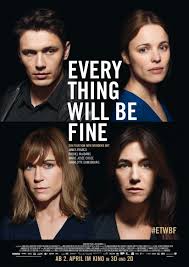
EVERY THING WILL BE FINE
US/Germany, 2015, 119 minutes, Colour.
James Franco, Rachel Mc Adams, Charlotte Gainsbourg,
Directed by Wim Wenders.
Director, Wim Wenders, would not have imagined 40 years ago that his entry to the Berlin Film Festival of 2015 would be an American film, set in Canada, rather conventional in its style, with a great deal of feeling, even sentiment - which did not exactly endear him to the Festival audience or to Germans.
This is the story of a novelist, played with quite some feeling by James Franco, different from many of the roles he usually takes on. He is in an unhappy situation, relations-wise, with Rachel Mc Adams. He has taken some time off, spending it in the ice and snow with a group of workers, getting material for a novel.
The key event occurs almost immediately, a little boy sliding out from the snow into the path of his car. He is shocked, takes the boy, gives him to his mother, Charlotte Gainsbourg, who makes a frightening discovery. This affects the novelist, but he is exonerated from any blame by the police for the accident and the mother is extraordinarily forgiving, although she blames herself for being absorbed in a novel (Faulkener’s As I A Dying, which Franco had directed in its film version!) and not noticing the evening coming on and the children at play.
The screenplay has three time jumps, a two-year period, to four-year periods.
This means that we can follow the life of the novelist, the effect of the accident, his contacting the mother, offering to do anything that he could, comforting the mother who goes through a ritual of burning the novel to purge something of her guilt.
During these time gaps, the author begins a new relationship with a woman who has a daughter, rather outgoing and precocious, who likes the novelist and would not be unhappy to have him as her stepfather. Another key event happens, rather more low key, when the group go to a fair, enjoy the rides, but witness the collapse of one of the carriages and the novelist lifting the carriage so that the injured person can be retrieved. His partner is quite moved and, then, upset that the novelist is so phlegmatic in his response, even to reading a book calmly – and she refers angrily to the effect of the previous accident on him.
In the last period, the boy of the accident has now grown into a teenager, puzzled about the novelist and his role in the accident, writing him a letter wanting to meet him. He has not told his mother, but she discovers the letter and urges the novelist to meet with her son. Which he does. In the meantime, he has married, the stepdaughter is growing up, and there seems to be some happiness in this family life. At one stage, he encounters his previous lover and is surprised by her unexpected reaction to him
There is something of a bizarre incident towards the end of the film which disturbs the wife, but it is something which helps bond him to the young man and his hopes for the future, even to being a writer.
The film was made in 3D, effective in its way, but seemingly unnecessary for this kind of film. It is an American film of sentiment, probably pleasing for most audiences, but still rankling with those who have put Wenders on a pedestal and cannot forgiving forgive him for making such a conventional entertainment.
1. The title, the tone, experience, sentiment, hope?
2. The Canada settings, the seasons, the ice and snow, the accident on the road? Spring and summer, warmth, sunlight? The homes, the streets, the publishing house, the concert hall? The musical score?
3. The career of Wim Wenders? His narratives, his documentaries? This film as particularly American in tone and sentiment?
4. A slow-burner, the cumulative effect of characters and incidents, plot twists and developments?
5. Thomas as the focus, James Franco’s presence, the initial waking, in the caravan, in the snow, the fisherman, on the jetty, driving his car?
6. The dramatic impact of the accident, his partly paying attention, with the sudden appearance? The drama of finding the boy, alive, walking home with him, carrying him, seeing his mother inside the house, and her reading of the book? Her immediate question as to where was Nicolas? The other son, under the car, dead? Grief?
7. The effect on Thomas, the reassurance of the police? The effect, over the years?
8. The phone calls to Sarah, the accident, his blunt telling her that he did not want to carry on? Leaving, drinking, the pills, taken to hospital? Phoning Sarah, the visit? His wanting to come home?
9. Two years later, the mother and her son, the care for him, Thomas and his visit, the discussions, phoning him, his going to see her, her tenderness, kindness and forgiveness? His card, the gift of the religious book, but it not having an effect? Her wanting her own ritual, tearing up the book by William Faulkner that she was reading, that she should have brought the children in? The farewell, that they would never see each other again?
10. The passing of four years? Thomas not with Sarah? With Ann, picking up her daughter from school, the precocious girl, happy, seeing the woman reading Thomas’s book, getting the autograph? Going to the fair, enjoying it, the accident and Thomas lifting the weight for the woman to be retrieved? Ann and her hand trembling, wanting some emotion, Thomas and his being phlegmatic, reading the book, Ann talking about the memories of the accident, his saying she was accusing him?
11. Four more years passing? The mother, her professional drawing? Her sketching Christopher, the discussions, his story about the main falling and blaming the dog? And his wanting to be a writer? At college? Writing the letter to Thomas, its tone, his wanting to meet, to resolve questions from the past? Thomas’s reply, hesitation, saying that he could not have emotional disturbance because he was finishing his book? The mother seeing the letter, phoning Thomas, requesting him to meet her son?
12. The meeting with Christopher, issues of blame, memories, whether Thomas used his carrying Christopher on his shoulders in his novel? Thomas explaining creativity, the sources for ideas? Christopher saying he wrote better books after the accident? The request for autographs of all the books?
13. Thomas, his father, his visits, the father’s character, getting old, dressing for the outing, in the car, his wanting to sit by the river?
14. The publisher, encouraging Thomas over the years? The achievements? Fame? Going to Toronto, the award of the prize?
15. Going to bed, the urine on the bed? Ann and the daughter going to her parents? Thomas waiting, Christopher outside, setting the drink, his coming in, their talking? The mother selling the house, going to England? Christopher and his riding his bike away, some satisfaction?
16. The final close-up of Thomas and his smile – and some hope for the future?
Published in Movie Reviews
Published in
Movie Reviews
Tagged under
Saturday, 18 September 2021 19:54
I Am Michael
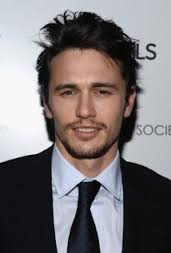
I AM MICHAEL
US, 2015, 95 minutes, Colour.
James Franco, Zachary Quinto, Charles Carver, Emma Roberts, Daryl Hannah, Leslie Ann Warren.
Directed by Justin Kelly.
The Michael of the title is Michael Glatze on whose experience the story is based.
At the opening, he appears in 2008 as a pastor during a counselling session with a young man with a homosexual orientation, indicating that the man could change, and drawing on biblical teaching for his point of view.
The transition in the screenplay is strong, going back to San Francisco in 1998 where Michael is an openly gay man, a well-known journalist on a gay magazine, and in a partnership which seems to be solid and has a future. Michael is played by James Franco, who has been involved in a number of gay-friendly features and documentaries. Zachary Quinto is his partner. The film has been executive produced by Gus Van Sant.
Michael seemed to have everything going for him, work on the magazine, strong editorial discussions about stances to be taken, many critical of more evangelical religious organisations who use biblical arguments against homosexuality. He is popular as a speaker and a number of gay men express their appreciation of his perspective and advice. When his partner, Ben, gets an invitation to go to Canada for work, Michael hesitates but goes with him. However, in Canada he is unsettled, his outlet being a blog.
But, on the way, he visits his old home town of Olympia, remembers the effect of his mother, encounters a young gay man who prays devoutly at a family funeral, seeming to be able to cope with his sexual orientation and his religious faith. Michael has entered into a new relationship which becomes a threesome with Ben. The have a grant to travel around the United States interviewing young gay people and presenting their findings to audiences for discussion.
Michael, however, has a panic attack, remembering his father’s illness and sudden death. While he is reassured, his mind turns to thoughts of death, God, faith, life after death. To the surprise of everyone, especially Ben and the readers of the blog, Michael starts to talk about faith, changing his sexual orientation, returning to what is “normal”, phrases which hurt Ben and others who read the blog.
In fact, Michael leaves Ben, travels in the United States, decides to go to biblical school to get a degree and to become a pastor. While he is there and plays in a recital, music having been his major study at university, he encounters a young woman, Rebecca (Emma Roberts) who is to be his future wife. While he still wants a certain independence in his life, he does become a pastor with his own church. (The screenplay also takes up the theme seen at the beginning of the film, with the young man not following through the advice that he received from Michael.)
The film ends in 2008 with Michael and Rebecca on the verge of the Ministry in their own church, which seems rather open-ended. However, the actual Michael Glatze saw the film and approved of it, which seems to mean that there has been until now a happy-ever-after ending with Michael pursuing his religious direction, moving away from his sexual orientation).
It is interesting that James Franco supported this film, which seems to offer an open-mind on changes in sexual orientation while maintaining that this is, if not impossible, rather improbable.
1. A true story? The perspective on homosexuality, the possibilities for change to heterosexuality?
2. An American story, San Francisco, Colorado, Wyoming? The scenes in Canada, Halifax? The sense of each city? The musical score?
3. The opening, Michael and his client, discussions about homosexuality, lifestyle, trying to persuade the young boy, his stances – and Michael later
seeing that the advice was not followed?
4. 1998, San Francisco, Michael and his look, blonde hair, gay lifestyle, his partnership with Bennett, the domestic life, the outings together? Is working on the magazine, the staff meetings, discussion about stances, the churches and moral attitudes? His articles, the influence, being quoted, giving talks? The gay culture, Michael and his having accepted his orientation after his childhood, his self-esteem?
5. Bennett, his personality, discussions with Michael, loving him, their shared life? The invitation to Halifax for the job? Michael agreeing? Finding it too difficult after a time, blogging, not enough and his leaving?
6. The visit to Olympia, memories of his growing up, flashbacks to his mother? Her death? His concern about his father, heart disease, walking along and suddenly collapsing and dying? Michael and his panic attacks, Bennett taking him to hospital, the doctor, the repeat requests, the tests? His not having his father’s disease?
7. Meeting Tyler at the club, the encounter, sexual? Bringing him home, threesome?
8. The documentary, the grant, the three travelling the United States, the variety of interviews, the people and their comments, excerpts used for presentations, audience reaction?
9. Michael and his panic, sense of his health, his father, consciousness and death, of afterlife, of religious dimensions? Watching people? The importance of the gay man, the funeral, his prayer, Christianity as credible? Michael sharing, sense of God, going into the church? His enquiry, the Scriptures, talking with
Tyler and Bennett?
10. The blog, his change of stances, the articles, his hurting people and their basic attitudes, his references to abnormal and normal life…? God’s attitude?
11. His conversion, in himself, becoming more stern, reading the Scriptures, quoting them? Enrolling in Bible school? The lectures, his learning?
12. His piano recital, his musical background, Rebecca watching him, meeting in the diner, their talking, the date, and her not liking sushi? Rebecca and her clothes, a friend warning about her dress, not tempting men, warning about Michael? Rebecca googling and discovering the truth? Michael coming to talk with her?
13. The phone call to Bennett, Bennett saying how hurt he was, Michael’s stances, Bennett wishing him well?
14. Becoming a pastor, yet his sense of independence, his having to get his diploma in private? In the church, the sense of panic, people coming in? Rebecca supporting him?
15. In fact, his work as a pastor, his marriage to Rebecca? His approving the film?
16. Gay themes in characters, principles, magazines and articles, blogs? Bennett, Tyler, the editor and staff, the various friends?
17. Audience belief in and response to possibilities of changing orientation? Christian and biblical beliefs?
Published in Movie Reviews
Published in
Movie Reviews
Tagged under
Saturday, 18 September 2021 19:54
As We Were Dreaming
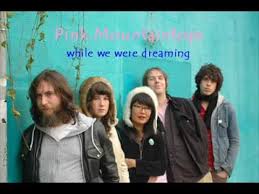
AS WE WERE DREAMING
Germany, 2015, 117 minutes, Colour.
Merlin Rose, Julius Nitschkoff, Joel Basman, Frederic Haselon, Marcel Heuperman.
Directed by Andreas Dresen.
Director Andreas Dresen some years ago made a film about elderly people and their relationships, Cloud 9. This time he has focused on children at school and young teenagers. And he presents a fairly grim picture.
The film is based on a well-known novel which takes placed in East Germany, the GDR, during the 1980s, the buildup to the Berlin Wall coming down and what life was like in East Germany at this time, the indoctrination that the children received at school, the expected loyalties to the government and to the state, the role of the teachers and their influence on the students, but the squalor of the aftermath as the students found a certain amount of freedom, gangs were formed in the cities and towns, the response to the music, the kind of hard rock mentality, the availability of drugs, the rebellion against adults are all dramatised in a way that will have a resonance on those who lived through this experience but could be quite alienating to an audience just looking in.
In fact, this presentation of young people, seeing them as good little children at school with high hopes, and then seeing how they turned out within 10 years, many of their lives in ruins, some dead from drug overdoses, others operating as dealers, some trained in boxing but falling foul of organisations and indulging in violence, one of the girls becoming a stripper.
Much of the action is seen from the point of view of the central character, Danny, who finds his friend Mark in squalid circumstances and drugs trauma. There are flashbacks, not only to childhood days, but also to the events and interactions which led to this situation.
Probably important as a record of difficulties in this particular time, the time when people were dreaming of what might be, but this is something of the harsh reality.
1. The 21st century perspective on East Germany, in its seclusion, politics, in the aftermath of the wall coming down, the picture of the young gangs?
2. The GDR, the small city, homes, the streets, the clubs, the world of boxing, drugs and dealing, gangs and bashing? Prisons?
3. The musical score, the music of the time, the beat, loud…?
4. The main story about the five young men, at school, growing up, teenagers, the influence of teachers in the school, principal, parents?
5. The flashbacks to the boys at school, getting the lectures about socialism, the Pioneers and their loyalty and expressions, the whole atmosphere of communism and socialism? The principal’s speeches? The children and the panel of teachers? The teacher later meeting Danny and admitting that they did not answer the children’s questions? The criticism of the politics of the GDR, the kind of brainwashing for loyalty, the socialism not preparing young people for life in the “real world”?
6. The opening, Danny searching for Mark, Mark and his addictions, the severity? this giving the opportunity for the main story?
7. The group, their friendship, interactions, dependencies? The rival gang, the brutality, the fights and the bashings?
8. Danny, the focus of the story, a good boy at school, mischievous, growing up, with the group, the music, the shoplifting, the police and hiding, the vandalism? Getting the club, the clientele? The rivals and the destruction of club, the beatings? His attraction towards Starlet, discussions with her? The police bringing him home, the reaction of his mother, her working hard, telling him off, yet his love for her? The wanting him to study and succeed? His being bashed by the group, after being chased? His smashing the shop window? The police, his having to go to prison for four weeks, the experience in prison, getting out, meeting up with the friends? The changes? His meeting up with Paul and their having a drink? Mark’s going to hospital? Dying? Danny blaming Pitbull because of his drug dealing? Rico, boxing, not a success, having to give himself up to the police? Going to the strip club? Starlet and her being a pole dancer, his reaction to Rico and Starlet and the sex, seeing Rico with the police? Danny’s future?
9. Paul, spectacles, parents, preoccupied about the girl and sexuality? Being one of the gang?
10. Pitbull, loud, his family, one of the gang, going into drug dealing, the finale, the funeral and the drinks afterwards, Danny throwing the drink in his face?
11. Rico, good at boxing, the training, the various bouts, the long fight sequence and his defeat? Attacking the boxer afterwards? Not at the funeral, the drinks with Danny, discovering Starlet, the sexual encounter in the toilet, thinking Danny didn’t know? Danny accompanying him and his being handcuffed?
12. A grim portrait of promising youngsters at school and their becoming a kind of lost generation?
Published in Movie Reviews
Published in
Movie Reviews
Tagged under
Saturday, 18 September 2021 19:54
Gone with the Bullets

GONE WITH THE BULLETS
China/Hong Kong, 2015, 120 minutes, Colour.
Jiang Wen, Ge You, Zhou Yun, Shu Qui.
Directed by Jiang Wen.
This film is quite an experience, although many audiences at the Berlin Film Festival Press Show, left halfway through. While it is on the screen, it is difficult enough to follow – but, if one reads the synopsis, the characters and events all fall into place.
The film has some historical background, the transition from the Empire to the Republic and the consequences for individuals, for the Empress and her advisers, for the warlords who now abounded and were creating nations for themselves, their own structures and government, as well as finance and corruption.
There is a competition in the film for courtesans from around the world – which is based on actual events.
The story is told from the point of view of a conman who claims that he was an adviser to the Empress, but was drunk when the transition took place and so lost his position, concentrating on frauds. In an opening scenes reminiscent of The Godfather , he listens to a young man who is upset that his warlord family has “new money” while he wants the respectability of “old money”. The conman and his friend – who was later to become an antagonistic police chief – decide to launder the money with the huge spectacle of the courtesan competition.
This film acknowledges film genres, not only The Godfather, but American musicals, especially those designed choreographies of Busby Berkely. And there is considerable tribute to opera, Puccini and Verdi, La Boheme and La Traviata. And Grieg features in the soundtrack.
There are quite some complications with the conman, his attraction to a woman who is found dead in next to him after a drug night, his imprisonment, the making of a black-and-white film (this is also based on fact) in which he stars, recounting the events of his life. A young socialite woman, with the disapproval of her parents, is in love with a conman and this leads to some final decisions and heroism.
The film was directed by Jiang Wen. His films are diverse, The Sun Also Rises as well the comedy and action of Let the Bullets Fly. He further enjoys himself by playing the central role in all its comic and serious complexity.
1. The title, expectations, of action? Expectations belied?
2. The film based on actual events? The history of China, the Emperor, the change to the Republic? The warlords and their creating their own nations? The history of the competition for the courtesans? The history of the student and his killings? China in the 1920s?
3. Shanghai, cosmopolitan, money, the problems, control, decadence?
4. The re-creation of the period, the city, the buildings and streets, the lights? The spectacle of the competition, the music and performances? Life in the city? The insertion of the old black-and-white film? The personal dramas? The French section of the city? The musical score, songs, Grieg, I’ll Take The High Road, Puccini, La Traviata…?
5. The influence of cinema, the opening interview and reminiscences of The Godfather? The Busby Berkely musicals and tap dancing, the chorus girls? The silent film black-and-white?
6. Ma Jouri, his story, the Empress, drinking, the influence, the cutting of the pigtails? His losing his status, becoming a conman, his lies, the stories and the tangles? His love, the murder, the black-and-white film, his policeman friend, pursuing him, imprisoned, the young woman in love with him, her family against him? Allowed out, his final actions?
7. The young man, his pleading with Ma Jouri, ultimately, it is wanting to get rid of his new money? Ma Jouri and his friend? Spending big, the competition, lavish, the spectacle of the musical numbers, the opera, broadcast throughout the world? The message to the Ukraine the peace? The donation to charity? The girls? The chorus?
8. The girl’s death, the parting of the ways with his friend, police ambitions, risen?
9. The making of the movie about the incidents, its style?
10. The system, the clash with her parents, love for Ma Jouri, the socials? The parties, the denunciations?
11. The end, love, self-sacrifice?
12. A kind of bizarre and avant-garde entertainment?
Published in Movie Reviews
Published in
Movie Reviews
Tagged under